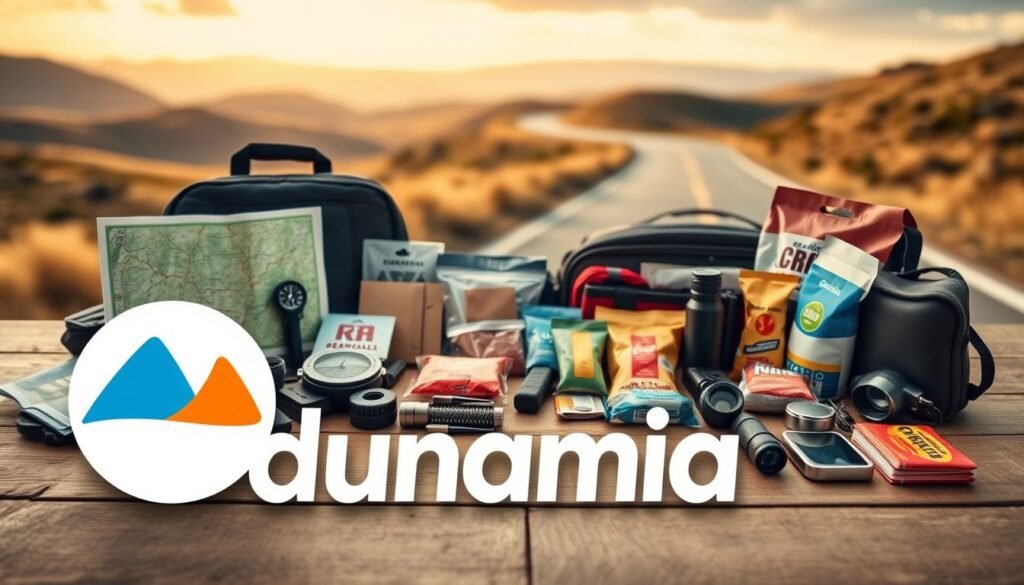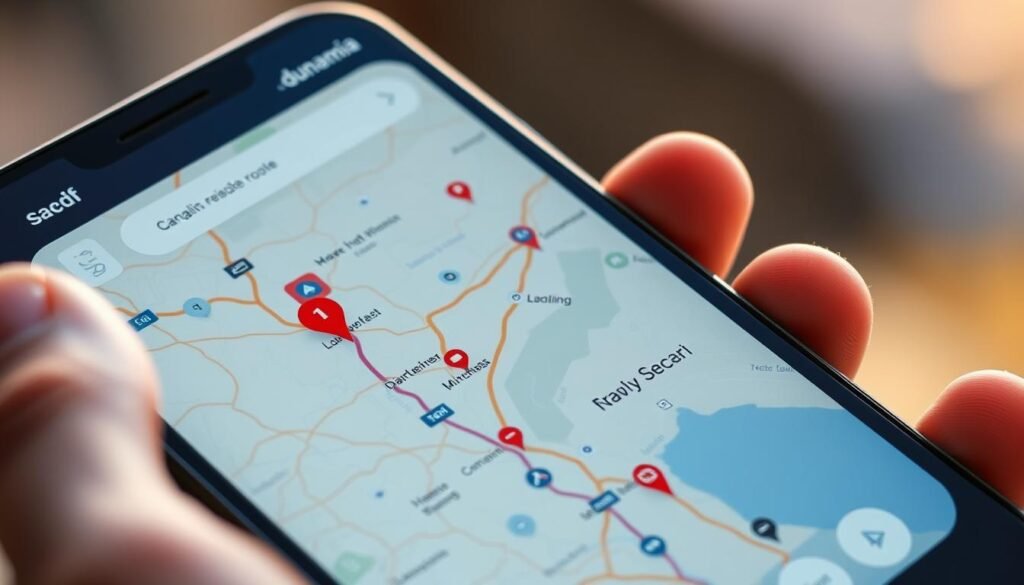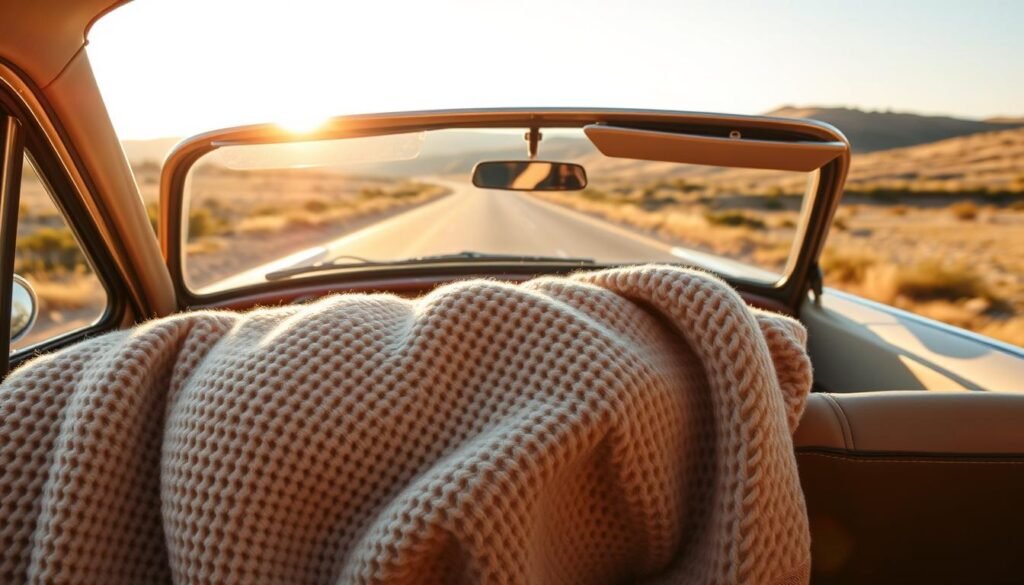Your cart is currently empty!
- One summer morning, I nearly missed sunrise at a national park because my phone died and I had no map. I learned fast: a small cooler and a reusable bottle kept us fed. A paper atlas saved the day when service dropped.
This guide is a long-form, practical list that helps you pack smarter for every road and trip scenario across the United States. Expect clear categories: documents, safety gear, navigation backups, hydration and food, power solutions, and comfort items.
We fuse expert tips—like the value of an $80 National Parks Pass, offline maps, an Anker powerbank, and a compact roadside kit—with field-tested habits to cut costs and stress. Carry small bills and quarters, stash an extra key, and email info@dunamia.com for feedback or collaboration.
Key Takeaways
- Start with essentials: license, registration, insurance, and a toll pass.
- Bring navigation backups: downloaded maps and a paper atlas.
- Use a reusable bottle and cooler to save money and eat better.
- Pack power solutions: car USB charger and a 13,000 mAh powerbank.
- Keep a compact roadside kit with jumper cables and first aid.
- Carry cash for campgrounds and rural services.
Why US road trips need a smarter packing plan right now
When routes pass through cell dead zones and sudden weather shifts, smart prep matters most.
The United States mixes vast distances, steep elevation changes, and remote areas. That makes road trip essentials and trip essentials practical, not optional.
Make sure you plan by mapping coverage gaps, noting places to refuel, and choosing backup navigation before departure. Weather swings mean layered clothing for cold desert nights and quick mountain snowfalls.
- Redundancy: backup power, offline maps, water, and first aid.
- Cash matters: small bills and quarters for campgrounds and pay stations.
- Buffer time: add margins for delays from construction or storms.
| Risk | Likely Areas | Best Prep |
|---|---|---|
| Signal loss | Deserts, mountains | Offline maps + atlas |
| Sudden cold | High elevation | Layered clothing, blanket |
| Cash-only services | Remote vendors | Small bills & quarters |
Teach each person a simple role for breakdowns. For questions or to suggest additions to this section, email info@dunamia.com.
The ultimate road trip packing list
A compact kit of documents, tools, and snacks keeps small issues from turning big.
Core documents and money
Carry your license, registration, and insurance in an easy-to-reach folder. Add small bills and a coin pouch with quarters for tolls and parking. Keep one extra key and the vehicle manual within the glove box or app folder.
Roadside safety
Stash a first aid kit, jumper cables, a flashlight or headlamp, and a spare tire with jack. Consider a portable inflator and a compact jump starter for quick fixes.
Navigation backups
Use a sturdy phone mount plus offline Google Maps and a paper road atlas. These three together cover most signal gaps and keep directions visible and hands-free.
Food, hydration, and comfort
Bring a reusable water bottle, a small cooler for perishables, and high-energy snacks like nuts and jerky. Add a travel mug, a packable blanket, pillows, and a hoodie for naps or cool evenings.
Personal care, clothing, and tech
Include sunscreen, lip balm, wipes, and hand sanitizer. Pack layers and hiking shoes. Round out power needs with a car charger, a compact powerbank, and headphones for passengers.
Want to add an item to this packing list? Reach out at info@dunamia.com.
Car travel essentials and pre-departure checks

A short checklist for papers and maintenance prevents small faults from becoming long delays.
Confirm documents and toll transponders: verify license, registration, and insurance are accessible. Add any regional toll pass you need so access through tolled corridors is seamless.
Do a basic vehicle maintenance check: check oil level, brake pads, tire tread and pressure, battery health, and top off wiper fluid. A quick lights-and-wipers test and a scan under the vehicle help spot leaks or faults before you depart.
Practical prep items
- Keep an extra key in a secure place separate from the driver.
- Store the car manual within reach for fast answers to dashboard alerts.
- Save roadside assistance numbers (for example, AAA) in phone and wallet.
- Inspect spare tire and jack; confirm you can access them quickly if needed.
| Check | Why it matters | Quick action | When to do it |
|---|---|---|---|
| Documents & transponder | Ensures access and legal compliance | Gather in one folder; test toll device | Before departure |
| Tires & spare | Prevents blowouts and long delays | Measure pressure, inspect tread, verify spare | Day before or morning of |
| Fluids & battery | Reduces risk of breakdowns | Top off washer fluid, check oil and battery | Weekly before trips |
| Tools & contacts | Speeds small repairs and calls for help | Pack gloves, basic tools, roadside number | Pack when you load gear |
Make sure you review the route for long stretches without services and plan fuel, rest, and food stops to match your vehicle’s range and crew needs. For checklist templates or custom advice, email info@dunamia.com.
Roadside emergency kit and safety gear
https://www.youtube.com/watch?v=bf3weHDwlwI
A compact emergency kit and a few practiced habits can turn a bad roadside moment into a quick fix.
Power and battery help
Pack jumper cables or a lithium jump starter. You never know when a dome light or an old battery will die. A jump is often the fastest case resolution and gets you rolling again.
Tire support
Include a spare, a reliable jack, a tire pressure gauge, and a portable inflator. Confirm the spare is serviceable and show each traveler where these live in the vehicle.
Visibility and lighting
Carry a bright flashlight and a headlamp so you can work hands-free at night or on a low-shoulder stop. Add reflective triangles or a vest to warn approaching drivers.
First aid and medical basics
Your first aid kit should cover common needs: bandages, gauze, antibiotic ointment, pain relievers, moleskin, scissors, tweezers, and alcohol wipes. For remote trips, consider a tourniquet and trauma shears—get training before use.
Practical extras and redundancy
Save your roadside assistance number (for example, AAA) in your phone and on a glovebox card. Toss in gloves, a basic tool set, and duct tape to handle small fixes that keep delays short.
- Quick tip: Build a compact kit so you can respond fast and minimize downtime on any trip.
- Review the kit seasonally and replace expired meds and weak batteries.
Want a printable emergency checklist? Email info@dunamia.com and we’ll send a ready-to-use PDF so you can check items before every departure.
Navigation made easy: maps, apps, and offline options

A solid navigation routine pairs digital downloads with a paper atlas and a secure phone mount.
Download offline Google Maps for every area you’ll cross. Do this over Wi‑Fi the day before you hit road black spots so turn-by-turn guidance works without a signal.
Carry a current road atlas as a no-signal backup. Paper maps never lose reception and they help when electronics fail in remote places.
Secure the phone: use a sturdy mount to keep directions visible and hands on the wheel. Vent clips and windshield mounts both work—test fit and charging when you pick up a rental.
- Pre-pin key places—fuel, groceries, trailheads, medical facilities—so you can navigate fast when connection drops.
- Save alternate routes for mountain passes or storm-prone corridors to avoid long delays during a trip.
- Combine Waze for live hazards and Google Maps for offline depth; switch by region for best coverage.
- Keep a small notepad for mile markers and exit numbers that might not appear in offline mode.
Make sure to revisit and refresh downloads after big detours or map updates.
For navigation checklists or questions, email info@dunamia.com.
Hydration, snacks, and cooler strategy
Smart choices for bottles, ice, and coffee keep energy steady and waste low on long days.
Reusable bottle vs. hydration pack
Bring a reusable water bottle for daily refills. It cuts plastic and saves money on bottled water.
If you plan to hike from a stop, a hydration pack is also great for hands-free sipping on the trail.
Small cooler picks and ice strategy
Soft coolers wedge into tight spaces and collapse when empty. Hard coolers keep items colder longer for multi-day runs.
Use slim ice packs to avoid soggy food and rotate them at overnight stops to keep cheese and fruit safe.
Coffee and snack choices
A sturdy travel mug keeps brew hot and reduces spills. For better coffee at camp, a Jetboil is a good idea for quick boils.
Pack satisfying snacks: mixed nuts, jerky, fresh fruit, and firm cheeses. Pre-portion into containers to cut clutter.
| Item | Best for | Pros |
|---|---|---|
| Soft cooler | Tight storage, day use | Flexible, lightweight, collapses |
| Hard cooler | Multi-day cold retention | Holds ice longer, rugged |
| Reusable water bottle | On-the-go hydration | Low waste, easy refill |
| Hydration pack | Hikes from stops | Hands-free, higher capacity |
Stash extra water jugs in the trunk to refill between towns and keep a microfiber towel near the cooler to catch spills. For product tips or snack hacks, email info@dunamia.com.
Comfort items for long drives

Small comforts make long drives feel shorter and keep everyone calmer between stops.
Bring a travel blanket that matches your needs — cozy fleece for naps or rugged nylon for outdoor evenings. A blanket per passenger helps balance varying cabin temps so the driver can focus on the road.
Pillows matter: a compact neck pillow or supportive travel cushion reduces fatigue between stops. One small change often yields better rest and fewer complaints on long stretches.
Pack an extra layer like a hoodie for quick temperature shifts. Store blankets in washable tote bags so they stay clean and stay accessible without digging through the trunk.
Low-volume playlists or calming music keep drivers alert and let nappers rest. Keep volumes modest so everyone hears horns, sirens, or warnings.
- Assign each person a small comfort kit: blanket, eye mask, earplugs.
- Choose quick-dry fabrics to handle spills and crumbs.
- Include a compact lumbar cushion for the driver on longer runs.
| Item | Best use | Why it helps |
|---|---|---|
| Travel blanket | Personal warmth | Adjusts comfort without changing climate controls |
| Supportive pillow | Short naps | Reduces neck strain and fatigue |
| Lumbar cushion | Driver comfort | Improves posture on long hours |
For comfort tips or recommendations, email info@dunamia.com.
Personal care, sun protection, and first aid
A compact personal-care pouch keeps comfort and basic medical help within reach during any long drive.
Sunscreen, hat, and sunglasses: UV exposure is strong in many Western and high-elevation areas year-round. Apply sunscreen before you step out and wear a wide-brim hat and good sunglasses to reduce sun damage and glare.
Sunscreen routine and quick refreshes
Keep a small bottle of broad-spectrum sunscreen and reef-safe options if you’ll visit lakes or coastlines. Reapply after sweaty activity or prolonged sun exposure to protect skin on long drives and short hikes.
Lip balm, wipes, and hand sanitizer
Store lip balm, alcohol wipes, and hand sanitizer in the center console for fast access. These items freshen faces and hands without a long stop and cut discomfort on dusty stops.
First aid kit add-ons
Upgrade your first aid kit with tweezers, scissors, alcohol wipes, moleskin, and a compact mirror. Pack a tourniquet only if someone in your group is trained to use it; training matters for safe application.
| Item | Use | Why it helps |
|---|---|---|
| Sunscreen (small bottle) | Skin protection | Prevents sunburn and long-term damage |
| Lip balm & wipes | Comfort & hygiene | Quick refresh without a stop |
| Tweezers, scissors, alcohol wipes | Minor wound care | Handles splinters, cuts, and cleaning wounds |
| Moleskin & compact mirror | Blister care & checks | Stops small issues from getting worse |
Practical tips: Store personal care in a clear pouch so you can see supplies at a glance. Rotate sunscreen and sanitizer into day packs before hikes. You never know when a small cut or blister will pop up; quick aid keeps morale high on multi-day trips.
For personal care checklists or suggestions, contact info@dunamia.com.
Clothing and footwear for variable US climates
A compact wardrobe that mixes light layers and sturdy shoes keeps you ready for many scenes.
Layering for desert nights, mountain mornings, and humid afternoons
Build a flexible trip packing list around thin, insulating layers and quick-dry fabrics. A base tee, a breathable mid-layer, and a light wind or rain shell handle wide swings in temperature.
Sun shirts and light pants cut sunscreen reapplication and ease sun exposure. Carry a small rain jacket like the Columbia Arcadia—storms appear fast and dry layers keep you comfortable.
Footwear options: walking sandals, hiking boots, and spare socks
Footwear matters for towns and wild places. Walking sandals (Teva) work well for errands and easy trails. For rougher routes, choose sturdy hiking boots (Merrell or Oboz) with ankle support.
Pack spare socks to swap after hot hikes; dry feet reduce blisters and make the car more pleasant.
- Choose neutral colors and quick-dry fabrics to simplify mixing outfits.
- Use packing cubes to separate warm and cool items for fast access.
- Keep a shoe bag so dusty boots don’t soil blankets or bags.
| Item | Best use | Why it helps |
|---|---|---|
| Sun shirt | High UV days | Reduces sunscreen reapplication, cools skin |
| Rain jacket (Columbia Arcadia) | Unexpected storms | Light, breathable, packs small |
| Hiking boots (Merrell/Oboz) | Rocky trails | Support and traction |
| Walking sandals (Teva) | Town & easy paths | Comfortable, quick-dry |
For packing light or a capsule wardrobe for mixed climates, email info@dunamia.com.
Road trip tech, power, entertainment, and smart extras
Good tech choices turn common delays into minor annoyances and keep everyone entertained between stops.
Power sorted: use a multi-port USB car charger, quality cables, and a compact powerbank. Add a power inverter when you need AC for cameras or laptops. Pack extra jumper cables even if you carry a jump starter for redundancy.
Must-have apps
Install GasBuddy to find cheap fuel, Waze for live hazards, and SpotHero to reserve parking. Add a podcasts app for long stretches and offline navigation where needed.
Entertainment and extras
Curate playlists, audiobooks, and podcasts ahead of time. A small Bluetooth speaker is also great for campsites or picnic stops off the car.
- Organizers: trunk organizer, car trash can, UV window shades, and a compact vacuum.
- Carry cash and a coin pouch with quarters for toll booths, meters, and laundry.
- Visitors: consider a portable Wi‑Fi hotspot (for example, Solis) and travel insurance such as World Nomads.
For app or gear recommendations tailored to your route, contact info@dunamia.com.
Conclusion
Finish strong by focusing on a few high-impact items that save time, money, and hassle on every outing.
Before you hit road, skim your final packing list: documents, maintenance checks, a roadside kit, navigation backups, and comfort items are the pillars of a smooth day.
Keep water close with a reusable bottle and a spare jug in the trunk. A simple coffee plan and pre-portioned snacks keep energy steady and on schedule.
Remember the big wins: an annual National Parks Pass, offline maps plus a paper atlas, a cooler, and basic first aid add resilience. For international visitors, portable Wi‑Fi and travel insurance wrap up loose ends.
Save this guide and email info@dunamia.com to request a downloadable checklist or share your favorite things and hacks.

